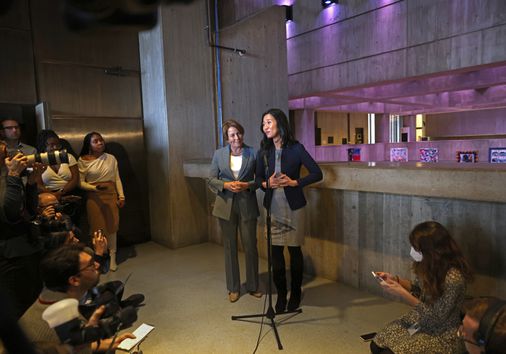|
Getting your Trinity Audio player ready...
|
It’s a familiar push and pull between Massachusetts governors, who represent a millions-strong electorate dominated by independent voters, and Boston mayors, who represent a much more liberal slice of that population.
The difference now is that instead of Republican Charlie Baker, it’s a Democrat in Beacon Hill’s corner office, albeit one who’s cultivating a centrist, pro-business reputation. The emerging alliances between the new governor and the corporate sector illustrate the ways in which Healey seems to be emulating Baker, who was beloved by many of the state’s most prominent business leaders. And they underscore the differences between Wu and Healey, a pair whose dynamic is more complicated than their shared party and similar credentials might suggest.
“Healey has hit the ground running as it relates to the business community,” said Jim Rooney, who leads the Greater Boston Chamber of Commerce. Wu’s relationship with business leaders, meanwhile, is a “work in progress,” he said.
“They came into it with a different set of built-in relationships,” Rooney added. “There’s a feeling that there’s more of a willing ear at the state level.”
It’s still early in her tenure as governor, but Healey has made it no secret that she is courting the business world. In her inaugural speech, she spoke directly to industry leaders concerned about losing the Republican Baker, promising them to be “partners every step of the way.”
“You help drive our economy and you will help build our future,” she said.
She has kept up that drumbeat with a number of early trips to businesses, visiting Ludlow Mills in Western Massachusetts and the manufacturing company Analog Devices in Wilmington. In a January speech to the Associated Industries of Massachusetts, Healey pledged “tax relief” that would benefit both business owners and families. She is expected to file a package of tax breaks March 1. Business leaders are glad to hear Healey talk about improving Massachusetts’ “competitiveness” as a business environment — a goal the governor says will also require driving down costs for working families and improving public transportation.
Business leaders say they collaborated well with Healey when she was attorney general, and ties have only strengthened since she assumed higher office. Jay Ash, CEO of the Massachusetts Competitive Partnership, described a “very strong relationship.”
“The thing the business community appreciates the most right now is her willingness to listen,” Ash said. “She hasn’t made any commitments on anything, but she’s shown a willingness to endorse the need for a competitive Massachusetts economy, and that is music to the ears of the business community.”
Wu’s administration insists she is prioritizing industry perspectives, too. But now in her second year as mayor, many business leaders used to wielding influence in the city still say her progressive administration has kept them at a distance or worse. North End restaurant owners, for example, are apoplectic after the city announced Thursday it would severely limit outdoor dining in the neighborhood this year.
Perhaps no sector is more at odds with the mayor than real estate — and it’s not lost on landlords and developers that Healey has final say over many of Wu’s policy priorities in that realm. Thanks to a striking concentration of power at the state level, Wu cannot cap rent increases or tax high-dollar real estate transactions — two of her top economic priorities — without sign-off from the Legislature and governor.
Solving Boston’s housing crisis is a priority for the mayor, and much of her agenda relies on funds flowing from the real estate industry: atransfer tax proposal; higher linkage fees paid per square foot by developers; requirements to build more affordable housing as part of new projects.
Consistent revenue from thriving private industries is crucial for supporting Boston’s neediest, she has argued.
“Over the last decade, Boston saw the largest building boom in generations. … But that growth wasn’t harnessed for the benefit of all our communities,” Wu said last month in her State of the City address. “We’ll deploy every tool, every strategy, and every resource to create more housing that residents can actually afford.”
But while many housing advocates praise Wu’s efforts, real estate has balked, warning that in this precarious economic moment of climbing interest rates and steep construction costs, her proposals would eat into their profits or even make projects unaffordable, grinding much-needed construction to a halt.
“You keep going down the road and add a little bit more here, a little bit more here,” said Greg Vasil, CEO of the Greater Boston Real Estate Board, a lobbying group and trade association. Eventually, he warned, developers will take their blueprints to less expensive markets, threatening a major source of city revenue.
“I’m not sure what goes on inside [City Hall] and what kinds of discussions they have,” Vasil said. “There’s a lot of idealism, but I don’t know how much there is actually math.”
Should Wu’s proposals make it to Beacon Hill, he predicted, state officials “will take a long hard look.”
Even some who are more ideologically in line with Wu politically have concerns. Dave Madan, a developer with Boston Investments, praised Wu’s rent control proposal as “a pretty balanced approach,” but had reservations about her plan to change Boston’s inclusionary development policy to require that developers set aside a larger share of new projects for affordable housing.
“It doesn’t seem like that’s going to be productive” for boosting housing construction, Madan said. “Economic vitality and growth should never be taken for granted.”
Madan said he remains committed to the Boston area, where his firm sells and rents homes, though his portfolio sits outside city limits. Perhaps telling: He spoke to the Globe on the phone from South Carolina, where he was scouting potential real estate opportunities.
Amid the opposition, there have already been setbacks: In a blow to Wu’s development agenda, the Boston Planning and Development Agency Board recently tabled her plan to restructure the agency, with one board member refusing “to accept immediate changes without clarification as to what those immediate changes are.”
Wu aides insist the mayor’s relationship with business is not distant, though it may look different than those of past administrations. That’s because her priorities are different, they say: She’s focused on meeting with industry leaders in groups to discuss policy rather than meeting developers one-on-one to discuss individual proposals. A number of real estate developers were recently tapped to advise the city on reforming the development review process, for example. And the administration has already granted the industry one notable concession, delaying the higher linkage fees until 2024.
“We’re committed to working closely with the business community on the concerns we share and on partnerships to strengthen the city — on transportation and climate, on housing, and how we support schools and young people — not just on individual building projects,” said Tiffany Chu, Wu’s chief of staff. “The response we’ve seen is really positive.”
Wu met with developers just after Thanksgiving, at the Bolling Building in Roxbury, and asked for help funding renovations at several Boston schools. Industry leaders are used to such requests from politicians, but some who attended the November meeting said they were put off that a mayor who had refused to meet with them about their projects was now coming to them for money.
Interpersonal politics are a factor, too. The mayor promised to bring new people to the table in her administration; now, some of the city’s traditional power brokers are dismayed they’ve lost their once-influential spots at the same table. The major real estate developers who sketch Boston’s skyline can no longer get the one-on-one meetings they enjoyed with previous mayors. They meet instead with Wu’s top aides, including Chief of Planning Arthur Jemison, who industry leaders say has been receptive to their feedback.
Some in the real estate world said it’s time for their industry to adapt.
“This is a new mayor. She ran with a new mandate, and business is not going to be as usual,” said Richard Taylor, a major Boston real estate developer who is working with the administration on improvements to the Trotter Elementary School in Dorchester. “Our industry needs to expect that she’s going to do what she said she’s going to do, and that is offer some policies that represent change. Full stop.”
Emma Platoff can be reached at [email protected]. Follow her on Twitter @emmaplatoff.



